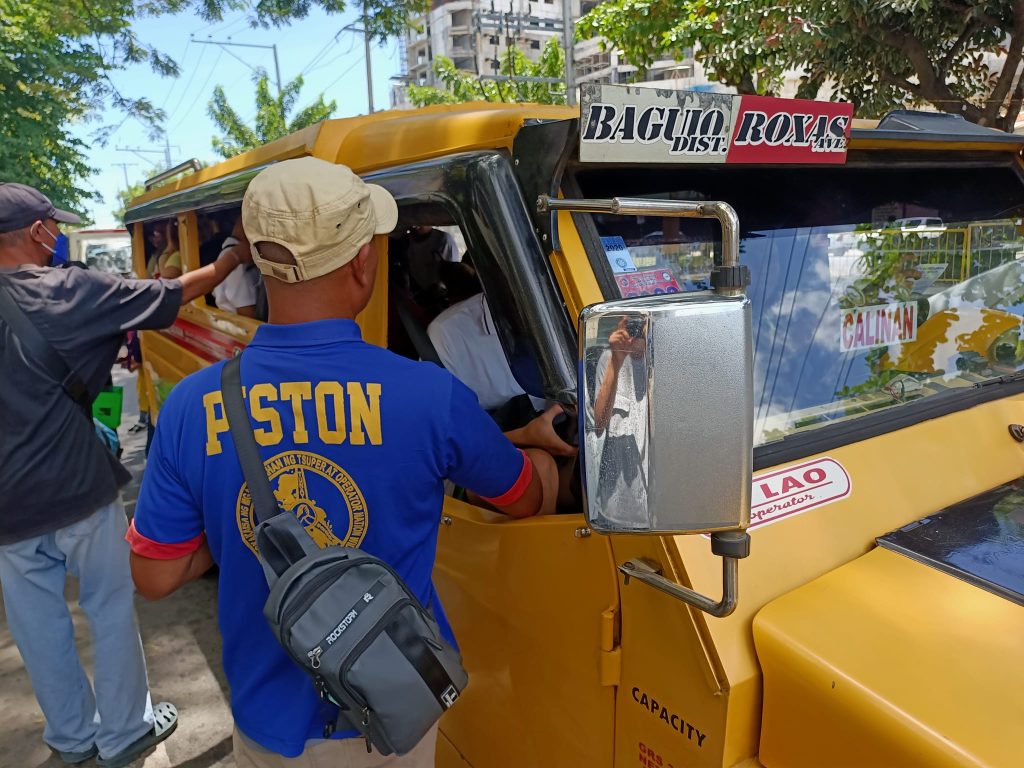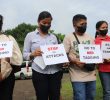
DAVAO CITY, Philippines – The city government’s direction of modernizing public transport is making jeepney drivers worried as their units will be phased out and they will lose their source of income.
The drivers’ sentiments came out even as they did not join the week-long nationwide transport strike organized by various transport organizations to oppose the phase-out of jeepneys.
Drivers interviewed by Davao Today said their plight is similar to jeepney drivers in Metro Manila and other cities, as they will lose their franchises and livelihood in the middle of the year “in the name of development and public convenience.”
“Sa katapusan kami man gihapon ang alaot. Kami ang makulob ang kaldero (In the end, we still suffer. We’ll be scraping our pots),” says Karling Gubat, a driver of a Matina bound jeepney.
Gubat, 47, rents a jeepney unit which he drives from five in the morning to around eight in the evening to sustain the needs of his family of four.
Wanting assurance
For him, the plan of the city government to phase out jeepneys to give way for modern public buses may be beneficial to commuters but this will affect thousands of drivers who will lose their source of income.
The city government of Davao along with the Department of Transportation is pushing through the Davao Public Transport Modernization Project (DPTMP), also known as the Davao High Priority Bus System (HPBS).
The program aims to improve the commuting system in the city “by establishing an efficient, safe, comfortable, and dependable public transport system.”
Some 1,000 modern bus units will be deployed which includes around 300 electric 18-meter buses.
The new transportation system is expected to employ 2,000 qualified bus drivers who pass all intensive capacity training under TESDA.
But out of the target 2,000 drivers, only 45 jeepney drivers had completed both manual and digital training under TESDA.
In 2021, the city government urged qualified operators and jeepney drivers affected to submit their application forms to avail of the social packages that include financial and non-financial assistance prepared by the government.
Drivers like Gubat think these assistance will not be sufficient.
“Pareho nako nga nanigulang na aning pag-drive, di nako basta makapangitag laing trabaho. Pananglitan maggnegosyo, asa man tawon pod uroy mi mukuha og puhunan nga karon pilara may kita sa jeep (Look, I’ve been driving this for years, I can’t easily find another job. They say start a business, where do I get capital if I only earn this much driving this jeep),” he said.
With a take-home income of 500 to 600 pesos per day, Gubat’s family of six only rely on him for their food, house rent, monthly bills for electricity and water, and the daily allowance for his five children.
Another driver, Silbestre Utig says he is not certain if the government can give them alternatives.
“Ang akoa lang kahadlok kay unsa ka sure matagaan mig trabaho ugaling nga ilisan na nila ang mga sakyanan. Kana man ilang pasalig atong seminar pero dili baya tanan to kay pila pud baya mi kabuok driver, unsaon man nil ana (I’m apprehensive, what’s the assurance they will give us jobs if our jeepneys get replaced? They assured us during the seminar, but there’s so many drivers here. How will they implement that?),” he asks.
Uting, 35, had just bought his multi-cab before the pandemic through his father’s retirement pay. He is now worried how he will support his family.
“Wala pa mi kabawi ani sa gipalit namo sa multi-cab. Pila ra may madawat namo anang ihatag sa gobyerno. Di na kasustain tawon, pareho ron stroke akong mama naa pay igsoon nako college (I haven’t recoup the money spent for this cab. How much will the government give us? It won’t sustain us. Now my mother suffered from a stroke, and I need to send my brother to college),” he said.
Solidarity protest
The local transport group Transmision-Piston said the modernization program will affect 15,000 jeepney drivers as around 5,000 units can no longer operate on the major roads of the city.
The nationwide weeklong strike, which Transmision-Piston is participating in through a rally on Monday, seeks to stop the modernization scheme implemented through Omnibus Franchising Guidelines.
Transmision-Piston leader Larry Arguelles said the government’s modernization plan burdens operators and drivers with its steep price.
He said this scheme will only pave the way for private companies “to monopolize the transportation industry in the guise of jeepney phaseout.”
“It’s clear that this only considers business interests, that they neglect thousands of drivers who will be burdened with this modernization plan,” said Arguelles.
Commuters also share their sympathy for the jeepney drivers’ plight.
One of the main concerns of commuters, when the HPBS will be implemented by 2024, is the cost of daily fare.
Commuter Linda Galbunancia, 33, who rides jeepneys every day to her work in a mall in Bajada said an additional cost of fare will be a burden despite the convenience that air-conditioned buses offer.
A minimum wage earner like her and her husband who works as a company security spends P60 per day on her commute. This is also the same amount spent by her children commuting to school.
“Syempre karon man gani perti nang budget budget nako para lang maigo among sweldo duha sa akong mister. Unsaon na lang na karon inig mumahal ang pamasahe, unsa nay among kan-on ani? (Of course, we are already stretching our budget with our salaries, what will happen if the fare increases? How will we feed our children?),” she said.
One student in a university thinks modernization is needed as the city embraces development. But another student sympathizes with the drivers.
“I think it’s pitiful that the drivers lose their jobs and that we are still in a crisis. We should rather add more jeeps because it’s hard for us commuters every rush hour where we can’t find a ride,” said Francis, who commutes from Buhangin to his university in Bolton Street.
Francis said it takes him more than an hour every morning to catch a ride to school and an hour or two on the rush hour ride home, which affects his mental health. (davaotoday.com)
davao city, jeepney, jeepney phaseout, philippines









